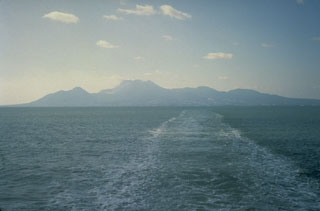Report on Unzendake (Japan) — July 1995
Bulletin of the Global Volcanism Network, vol. 20, no. 7 (July 1995)
Managing Editor: Richard Wunderman.
Unzendake (Japan) Increased seismicity, but pyroclastic flows and dome growth absent
Please cite this report as:
Global Volcanism Program, 1995. Report on Unzendake (Japan) (Wunderman, R., ed.). Bulletin of the Global Volcanism Network, 20:7. Smithsonian Institution. https://doi.org/10.5479/si.GVP.BGVN199507-282100
Unzendake
Japan
32.761°N, 130.299°E; summit elev. 1483 m
All times are local (unless otherwise noted)
Although Unzen's activity has generally waned during the past 7 months, during July the number of earthquakes (measured at Station A, 3.6 km SW of the dome) increased (table 16). For July, the total number of earthquakes was 61, and tremors, 31. On 12 July, 22 micro-earthquakes were recorded beneath the dome. One earthquake was felt at the Unzen Weather Station. Neither pyroclastic flows nor any dome growth were evident throughout July, despite four minor tiltmeter changes associated with the increased seismicity.
Table 16. Summary of Unzen's monthly earthquakes, tremors, and pyroclastic flows during 1995.
| Month | Total Earthquakes | Felt Events | Tremors | Pyroclastic Flows |
| Jan 1995 | 322 | 4 | 60 | 2 |
| Feb 1995 | 81 | -- | 16 | 2 |
| Mar 1995 | 15 | -- | 10 | 0 |
| Apr 1995 | 29 | -- | 18 | 0 |
| May 1995 | 22 | -- | 12 | 0 |
| Jun 1995 | 33 | -- | 39 | 0 |
| Jul 1995 | 61 | 1 | 31 | 0 |
Geological Summary. The massive Unzendake volcanic complex comprises much of the Shimabara Peninsula east of the city of Nagasaki. An E-W graben, 30-40 km long, extends across the peninsula. Three large stratovolcanoes with complex structures, Kinugasa on the north, Fugen-dake at the east-center, and Kusenbu on the south, form topographic highs on the broad peninsula. Fugendake and Mayuyama volcanoes in the east-central portion of the andesitic-to-dacitic volcanic complex have been active during the Holocene. The Mayuyama lava dome complex, located along the eastern coast west of Shimabara City, formed about 4000 years ago and was the source of a devastating 1792 CE debris avalanche and tsunami. Historical eruptive activity has been restricted to the summit and flanks of Fugendake. The latest activity during 1990-95 formed a lava dome at the summit, accompanied by pyroclastic flows that caused fatalities and damaged populated areas near Shimabara City.
Information Contacts: Volcanological Division, Seismological and Volcanological Department, Japan Meteorological Agency (JMA), 1-3-4 Ote-machi, Chiyoda-ku, Tokyo 100, Japan.

